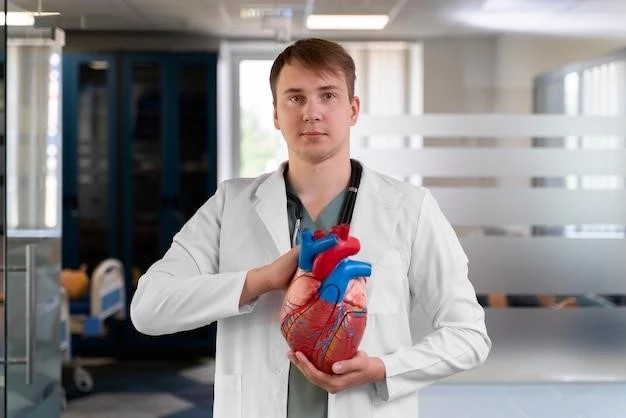I. Introduction to Kallmann Syndrome with Heart Disease
The co-occurrence of Kallmann syndrome and heart disease presents a rare yet impactful medical scenario with significant clinical implications.
A. Definition of Kallmann Syndrome and Heart Disease
Kallmann Syndrome is a rare genetic disorder characterized by the combination of hypogonadism and anosmia‚ the absence of the sense of smell‚ leading to delayed or absent puberty. Whereas Heart Disease comprises various conditions affecting the heart’s structure and function. When both disorders coexist‚ it poses complex challenges in diagnosis and management due to the intricate interplay between hormonal disruptions and cardiac abnormalities.
B. Rarity and Impact of the Combination of Both Disorders
The co-occurrence of Kallmann Syndrome and Heart Disease is exceptionally rare‚ presenting a unique medical challenge. The impact of this combination extends beyond individual health to encompass intricate genetic‚ hormonal‚ and cardiac interdependencies. Understanding the rarity and implications of these dual disorders is crucial for optimizing diagnosis‚ treatment‚ and counseling strategies to improve patient outcomes and guide future research endeavors in this complex field.
II. Understanding Kallmann Syndrome
Kallmann Syndrome manifests as a genetic disorder with delayed puberty‚ hypogonadism‚ and anosmia‚ impacting hormonal and olfactory functions.
A. Overview of Kallmann Syndrome
Kallmann Syndrome is a rare genetic disorder characterized by the combination of hypogonadism and anosmia. It affects the development of reproductive structures and the sense of smell‚ leading to delayed or absent puberty. Individuals with Kallmann Syndrome often face challenges related to fertility‚ sexual development‚ and emotional well-being due to hormonal imbalances. Understanding the complexities of this syndrome is crucial for accurate diagnosis and effective management.
B. Genetic Basis and Inheritance Patterns
Kallmann Syndrome’s genetic basis involves various gene mutations affecting the development of the hypothalamus and olfactory system. Inheritance patterns often follow an autosomal dominant or X-linked recessive mode. Understanding the genetic underpinnings of Kallmann Syndrome is essential for genetic counseling‚ early detection‚ and intervention. Research in this area plays a vital role in elucidating the complex genetic mechanisms contributing to the syndrome’s manifestation.
C. Absence of Puberty and Hypogonadism in Kallmann Syndrome
Kallmann Syndrome is characterized by the absence or delay of puberty and hypogonadism‚ resulting from impaired gonadotropin-releasing hormone production. This hormonal deficiency impacts sexual development and fertility. Managing the hormonal imbalances through appropriate therapies is crucial to support the affected individuals in achieving optimal growth and reproductive health outcomes.
D. Anosmia as a Common Symptom
Anosmia‚ the loss of the sense of smell‚ is a prevalent symptom in individuals with Kallmann Syndrome. This olfactory dysfunction stems from abnormal development of the olfactory bulbs in the brain. Anosmia not only affects quality of life but also serves as a diagnostic hallmark of the syndrome. Understanding and addressing anosmia in conjunction with other symptoms is essential for comprehensive patient care and management of Kallmann Syndrome.
III. Heart Defects in Kallmann Syndrome
Exploring the intersection of Kallmann Syndrome and heart disease uncovers intriguing insights into the complex relationship between these disorders‚ highlighting the need for meticulous research and management strategies.
A. Congenital Heart Defects Associated with Kallmann Syndrome
Congenital heart defects linked to Kallmann Syndrome encompass a spectrum of structural abnormalities affecting the heart’s chambers‚ valves‚ or major blood vessels. These cardiac anomalies can pose serious health implications and require tailored management strategies. Understanding the intricate relationship between Kallmann Syndrome and congenital heart defects is crucial for comprehensive care and improved outcomes in affected individuals.
B. The Linking Mechanisms Between Kallmann Syndrome and Heart Diseases
The connection between Kallmann Syndrome and heart diseases involves complex interplay. Shared genetic pathways or developmental processes may contribute to the co-occurrence of these conditions. Hormonal dysregulation in Kallmann Syndrome could also impact cardiac function. Exploring these linking mechanisms is paramount for advancing diagnostic approaches and tailored management strategies combining endocrine and cardiac care for individuals with this dual disorder.
C. Unknown Factors Contributing to Heart Defects in Kallmann Syndrome
Despite advancements in medical knowledge‚ the precise factors linking Kallmann Syndrome to heart defects remain uncertain. Researchers continue to investigate genetic‚ molecular‚ and physiological mechanisms that underlie the development of cardiac abnormalities in individuals with Kallmann Syndrome. Unraveling these unknown factors is crucial for enhancing diagnostic accuracy‚ treatment efficacy‚ and long-term outcomes in this complex patient population.
IV. Diagnosis and Management
Addressing the intricate diagnostic and therapeutic challenges of Kallmann Syndrome with heart disease necessitates a multidisciplinary approach integrating endocrinology‚ cardiology‚ and genetics for optimal patient care.
A. Challenges in Diagnosing Kallmann Syndrome with Heart Disease
Diagnosing Kallmann Syndrome with heart disease poses significant challenges due to the varied and overlapping symptoms of both conditions. The complexity arises from the need for specialized testing to identify hormonal imbalances‚ genetic markers‚ and cardiac anomalies accurately. Integrated medical expertise from endocrinologists‚ geneticists‚ and cardiologists is crucial for achieving an accurate diagnosis and implementing tailored management strategies for individuals with this dual disorder.
B. Treatment Approaches for Individuals with Kallmann Syndrome and Heart Defects
Treating individuals with Kallmann Syndrome and heart defects involves a comprehensive and tailored approach. Management may include hormonal therapy to address endocrine deficiencies‚ cardiac interventions to manage structural abnormalities‚ and fertility treatments to support reproductive health. Multidisciplinary collaboration among endocrinologists‚ cardiologists‚ and fertility specialists is essential to optimize patient outcomes and quality of life. Continuous monitoring and personalized care plans are vital for individuals with this complex dual disorder.
C. Research on Hormonal Therapy‚ Fertility‚ and Heart Disease Management
Ongoing research on optimal hormonal therapy‚ fertility options‚ and heart disease management in individuals with Kallmann Syndrome and heart defects is imperative. Studying the efficacy of treatment modalities‚ exploring new interventions‚ and identifying genetic markers associated with these conditions are key research areas. Advancements in understanding these aspects can lead to improved patient care‚ personalized treatment approaches‚ and better outcomes for individuals facing the complex challenges of this dual disorder.

V. Counseling and Genetic Implications
Providing counseling for psychological challenges and genetic implications is essential for individuals and families facing Kallmann Syndrome with heart disease‚ ensuring informed decision-making and support.
A. Psychological and Emotional Challenges Faced by Patients
Patients with Kallmann Syndrome and heart disease encounter significant psychological and emotional hurdles due to the complex nature of their conditions. From coping with delayed puberty‚ fertility issues‚ and cardiac concerns to managing the stress of multiple medical appointments and treatments‚ individuals may experience anxiety‚ depression‚ and self-esteem challenges. Providing comprehensive mental health support and counseling services is crucial in addressing these emotional difficulties and enhancing the overall well-being of patients.
B. Genetics Counseling for Families with Kallmann Syndrome and Heart Disease History
Genetic counseling plays a crucial role for families with a history of Kallmann Syndrome and heart disease‚ offering insights into inheritance patterns‚ risk assessment‚ and family planning. Educating individuals about genetic testing‚ prenatal screening‚ and potential implications for future generations is essential in facilitating informed decision-making and providing support to families navigating the complexities of these genetic conditions. Empowering families through genetic counseling promotes proactive healthcare management and personalized care approaches.
C. Implications of the Dual Disorders on Future Generations
The co-occurrence of Kallmann Syndrome and heart disease poses significant implications for future generations. Understanding the genetic basis‚ potential inheritance patterns‚ and associated health risks is crucial for family planning decisions and early interventions. Genetic screening‚ counseling‚ and education play pivotal roles in mitigating risks‚ promoting proactive healthcare‚ and empowering individuals and families to make informed choices regarding their reproductive health and the transmission of these disorders to subsequent generations.
